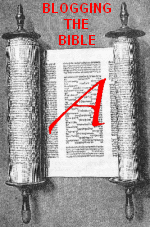 Now that Job’s friends have run out of abuse to heap on Job, the next section of the book is dedicated to speeches by Elihu. Elihu steps up because he’s disappointed that Job’s friends didn’t find enough arguments. Again it’s not clear where the authors’ sympathies lie. But the fact that the 6 Elihu chapters are an actual diatribe (Job doesn’t get a single line of response here) says something.
Now that Job’s friends have run out of abuse to heap on Job, the next section of the book is dedicated to speeches by Elihu. Elihu steps up because he’s disappointed that Job’s friends didn’t find enough arguments. Again it’s not clear where the authors’ sympathies lie. But the fact that the 6 Elihu chapters are an actual diatribe (Job doesn’t get a single line of response here) says something.
I have to hand it to Elihu, at least he has actual arguments. Maybe it has something to do with his speech being mercifully-short (compared to the first 31 chapters of Job). Anyhow, at least this makes it possible to respond to each one:
Argument from the stick
The claim is you can’t take issue with God being unjust because God can kick your ass. There is a very similar logical fallacy on the books called Argumentum ad baculum. Although in this case the translation (argument from the stick) sounds much better. Now, very few people would put the argument as crudely as I did. But Elihu is very direct:
For God surely does not act wickedly;
Shaddai does not pervert justice.
Who placed the earth in His charge?
Who ordered the entire world?
If He but intends it,
He can call back His spirit and breath;
All flesh would at once expire,
And mankind return to dust (34:12-15)
I can’t think of any other interpretation to the passage other than “God’s might makes right”. The arrangement of the argument is no accident.
Respecting the status quo
Elihu also uses this gem: Is it proper to say of a king, ‘scoundrel’; ‘wicked,’ of nobles? (34:18). Now, this is an impressive argument thousands of years ago where absolute obedience to a capricious dictator is the only known reality. But today, even most religious conservatives value freedom of conscience and the words lose their force.
Interestingly enough, these days it’s a cornerstone of religious conservatism that secular governments should be opposed because they’re unjust. So contra Elihu, God shouldn’t get a pass simply by being an authority, even in the eyes of teabaggers.

Sacred mysteries
I think these days, the main apologetic answers to the problem of evil are the free will defence and the “it’s a sacred mystery” defence. Here’s an ancient version of the latter. Elihu lists a bunch of wonderful things God can do and ends with:
Can you help Him stretch out the heavens,
Firm as a mirror of cast metal?
Inform us then, what we may say to Him;
We cannot argue because [we are in] darkness. (37:18-19)
Here I don’t really disagree with Elihu. IF there is a God then it’s possible that God MIGHT have some explanation for the prevalence of evil that we’ll all find satisfactory. But this doesn’t mean there IS an explanation, and it certainly doesn’t mean that we should assume there is one. At least it’s interesting that the best response to the problem of evil (we don’t know) has been anticipated in the Bible.
A final interesting tidbit: Elihu says the heavens are firm. The ancients believed in a heavenly sphere (a dome that enveloped the earth). Since Elihu’s talking about the wonders of the world, there’s absolutely no reason to take the passage metaphorically. This is yet another counterexample to those literalists who think the Bible predicted the Big Bang, and other claims that it somehow exceeded the scientific knowledge of its writers. It didn’t. But when a passage get something wrong because the authors were ignorant of the science, the best explanation is that indeed they were ignorant of it.





0 Comments